 |
 |
 |
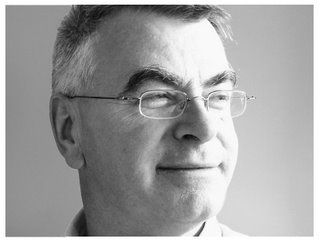 Dr. György Buzsáki: At the forefront of Neuroscience Research Dr. György Buzsáki: At the forefront of Neuroscience Research
“… The critical factors in science seem to relate to asking an important question and building up a sufficiently intense motivation to solve it.” - György Buzsáki
When it comes to motivation, TDLC Senior Investigator György Buzsáki has enough for an army of investigators. He is at the forefront of research in the field of neuroscience and is currently Board of Governors Professor at the Center for Molecular and Behavioral Neuroscience at Rutgers University.
György Buzsáki’s lab focuses on how neuronal circuitries of the brain support its cognitive capacities, with a primary interest in brain oscillations, sleep and memory. He explains: “Our goal is to provide 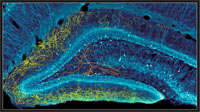 rational, mechanistic explanations of cognitive functions at a descriptive level. In our view, the most promising area of cognitive faculties for scientific inquiry is memory, since it is a well-circumscribed term, can be studied in animals and substantial knowledge has accumulated on the molecular mechanisms of synaptic plasticity." More rational, mechanistic explanations of cognitive functions at a descriptive level. In our view, the most promising area of cognitive faculties for scientific inquiry is memory, since it is a well-circumscribed term, can be studied in animals and substantial knowledge has accumulated on the molecular mechanisms of synaptic plasticity." More  |
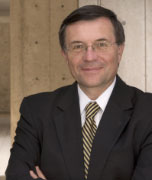
Terrence Sejnowski elected to National Academy of Engineering
Salk Institute professor and TDLC Co-Director Terry J. Sejnowski, Ph.D., has been elected a member of the National Academy of Engineering, Dr. Sejnowski is also a member of the National Academy of Sciences and the Institute of Medicine, making him one of only ten living individuals to have been elected to all three branches of the National Academies.
More 
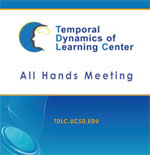 The TDLC All Hands Meeting 2011 The TDLC All Hands Meeting 2011
January 28-29, 2011
The annual gathering, once again hosted by UC San Diego, the Sheraton La Jolla Hotel and the San Diego Supercomputer Center-East, opened with a Trainee Reception and Dinner and closed with a Brainstorming Session/Dinner.
TDLC presented a Special Speaker Series with speakers Terry Sejnowski (Salk Institute), Marco Herrera-Valdez (Arizona State University), and Gyorgi Buzsaki (Rutgers).
Woven seamlessly into a strong schedule were13 informative presentations on research within the four science Initiatives plus six upbeat Trainee Talks and individual two-hour Initiative planning meetings. More |
|
Two Recent Studies on Face Processing:
> Inverted Faces are (Eventually) Processed Holistically (in press)
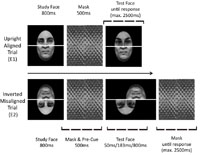 Collaborators: Jennifer J. Richler, Michael L. Mack, Thomas J. Palmeri & Isabel Gauthier --
Vanderbilt University Collaborators: Jennifer J. Richler, Michael L. Mack, Thomas J. Palmeri & Isabel Gauthier --
Vanderbilt University
Face inversion effects are used as evidence that faces are processed differently from objects. Nevertheless, there is debate about whether processing differences between upright and inverted faces are qualitative or quantitative. More
> Holistic Processing
Predicts Face Recognition
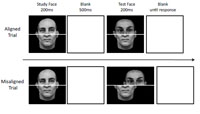 Accepted 12/10/10 for publication in Psychological Science Accepted 12/10/10 for publication in Psychological Science
Collaborators: Jennifer J. Richler, Olivia S. Cheung & Isabel Gauthier
The concept of holistic processing (HP) is a cornerstone of face recognition research. We demonstrate that HP predicts face recognition abilities on the Cambridge Face Memory Test and a perceptual face identification task. Our findings validate a large body of work on face recognition that relies on the assumption that HP is related to face recognition. More
|
|
|
|
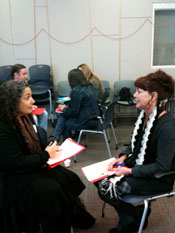 Distinguished Educator Panel Distinguished Educator Panel
Meet and Mingle with Scientists
Eleven of TDLC’s scientists and The Distinguished Educator Advisory Panel met one another in a form of “speed dating” on December 4, 2010. Educators and scientists alike agreed that the opportunity to meet one another in this format was an important step in understanding some of the bridges to be crossed in translational research. Following the pair meetings, two of the panel members who have research going on in their schools discussed their experiences with the process. Finally, Javier Movellan presented his ideas for strengthening educator/scientist interaction. First, he emphasized that scientists need educators, just as educators need scientists. He would like to see a research school operating in the medical model where educators and scientists “cohabitate” and thus truly understand the needs, the constraints and the possibilities of bringing research and education together to improve student outcomes.
|

...bringing science and practice together"
The third International Mind, Brain, and
Education Society (IMBES) Biennial Conference is coming up on June 2-4, 2011 in
San Diego, California. The event, sponsored by TDLC & Kavli Institute for
Brain and Mind, provides a forum to explore exciting new advances in the
emerging field of Mind, Brain, and Education. TDLC's Hal Pashler will be one of the Distinguished Plenary Speakers of the event. More
2011 Trainee Awards
The TDLC training committee has recently awarded small grants to support trainee research and collaboration. More
|
|
 |
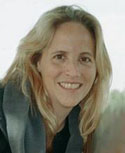 Featured Scientist: Marian Bartlett Featured Scientist: Marian Bartlett
TDLC Center Co-Director
Email: marni@salk.edu
Associate Research Professor, Institute for Neural Computation, and Director, Machine Perception Lab, UCSD
What is CERT and how can it be applied to basic research in human behavior, education, and medicine?
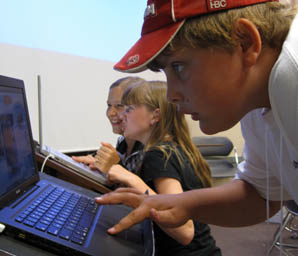 CERT, or Computer Expression Recognition Toolbox, is a software package for automatically detecting facial expressions. CERT was developed at UC San Diego, originating from a collaboration between Ekman and Sejnowski (Bartlett et al., 1996, 1999, 2006; Donato et al., 1999; Littlewort et al., 2006). The software performs real-time expression detection via web-cam input, and can automatically detect and code such expressions as anger, disgust, fear, joy, sadness, surprise, contempt, head pose, and 30 facial action units from the Facial Action Coding System. Automatic facial expression recognition tools such as CERT are beginning to bring about paradigmatic shifts in a number of fields by making facial expression more accessible as a behavioral measure. More CERT, or Computer Expression Recognition Toolbox, is a software package for automatically detecting facial expressions. CERT was developed at UC San Diego, originating from a collaboration between Ekman and Sejnowski (Bartlett et al., 1996, 1999, 2006; Donato et al., 1999; Littlewort et al., 2006). The software performs real-time expression detection via web-cam input, and can automatically detect and code such expressions as anger, disgust, fear, joy, sadness, surprise, contempt, head pose, and 30 facial action units from the Facial Action Coding System. Automatic facial expression recognition tools such as CERT are beginning to bring about paradigmatic shifts in a number of fields by making facial expression more accessible as a behavioral measure. More 
|
|
This message was sent from:
The Temporal Dynamics of Learning Center (TDLC.UCSD.EDU)
University of California, San Diego,
9500 Gilman Drive, La Jolla, CA 92093
To learn more about TDLC, please visit us on the web at: TDLC.UCSD.EDU
Please contact webmaster@tdlc.ucsd.edu to unsubscribe.
TDLC is a Science of Learning Center (SLC),
one of six SLCs funded by the National Science Foundation. NSF grant #SBE-0542013
|
|
 |
 |
 Feb/Mar 2011 Feb/Mar 2011
|
|
|
|
 |
 |
Babies Process Language in a Grown-Up Way
Research by UC San Diego scientists Eric Halgren, PhD, Jeff Elman, PhD, and Katherine Travis has shown that babies just over a year old can understand many of the words that adults are saying, and their brains process words they hear with the same brain structures as adults, and in the same amount of time.
More
|
 |
Map of scientific collaboration between researchers
Research analyst Olivier Beauchesne at Science-Metrix extracted & aggregated scientific collaboration between cities around the world from 2005 to 2009.
|
 |
QnAs with Terrence J. Sejnowski
(Proceedings of the National Academy of Sciences of the United States of America, December 2010)
More
|
 |
Learning Causes Structural Changes In Affected Neurons
The finding, published in PNAS by Mark H. Tuszynski, MD, PhD, professor of neurosciences and colleagues at UC San Diego School of Medicine, underscores the brain’s remarkable ability to physically change as it learns.
More
|
 |
Fifteenth International Conference on Cognitive and Neural Systems
May 11–14, 2011
Boston University
Speakers include TDLC researcher David Sheinberg (Brown University)
and several CELEST researchers. More
|
 |
Schizophrenia Gene Mutation
Found; Target for New Drugs
An international team led by Jonathan Sebat, PhD, at UC San Diego School of Medicine, has identified a gene mutation strongly linked to schizophrenia.
More
|
 |
TDLC Logos and Templates
The TLDC logo, PowerPoint template, and letterhead templates have been posted to the TDLC website. |

|
 Bilingual Brains Bilingual Brains
Scientists are learning that speaking more than one language may have cognitive benefits that extend from childhood into old age. Children who learn two languages before the age of five have a different brain structure than children who learn only one language. More 
(reference: Society for Neuroscience) |
|
|
 |

![]()
